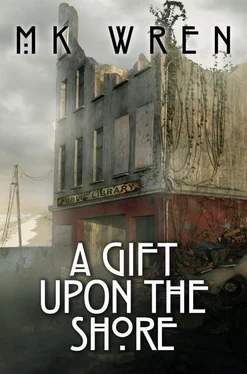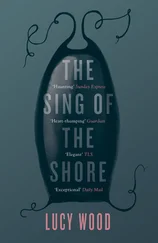An astute observation, but I neither speak nor move, and she asks, “Is there anything you haven’t told me? Anything hurting you?”
“No. Nothing you can do anything about.”
She snorts at that. “Well, maybe a few days’ rest will do something about it.” The bed shifts as she rises, and I open my eyes.
“Bernadette… where’s Shadow?” I can only hope I haven’t let too much anxiety come through in my voice.
“You want her in here?”
“Yes. Please.”
“I’ll find her.”
The door opens, closes. I lie waiting for what seems an hour, but no doubt is only minutes. I must have Shadow in this room with me.
And finally the door opens again. I shut my eyes, and I’m drowsily grateful when Shadow jumps up on the bed and nudges at my hand with her nose. I pet her perfunctorily, then seem to sink back into sleep. I hear the door close.
I’m not asleep. I watch the light fade into dusk, listen to sounds from the house: the family at supper; then the clatter of pots and dishes; then, finally, the house is quiet. I hear singing from the church.
I have no light to read by, so my mind flows free, casting up memories like flotsam. I remember my last phone call to my mother. I remember boys and men I loved, or thought I did. I remember making love. I remember deaths I’ve grieved. I remember walking with my parents on the beach, finding a shell so eroded in the tumbler of the waves that its outer wall was gone, exposing the spiral structure within. Dad said, “It looks like Mozart sounds,” and Mother laughed and sang a Mozart melody. She sang beautifully then, but she stopped singing after Dad died. But at that moment the nacreous spiral of the shell and Mozart made sense in relation to one another. And years later Rachel told me, “Painting works on the same level in the mind that music does. People think they’re responding to the subject matter. They aren’t. Not if the painting is good.”
I can’t see the paintings on my walls in this dim light. I don’t have to. I know them all, know their sources and the music in them. And I think about the books in the vault, remember the days before they were buried there, when Rachel pored over them, always frustrated by the shortage of time and light. It wasn’t only the knowledge in them she sought; that was subject matter. She sought the music—the music that sings in the mind in response to relationships sensed in time, in cause and effect, in the becoming of transitions. She hungered for that music and reveled in the realization that her appetite was insatiable.
Evening service is over, and Bernadette comes in to check on me one last time before she goes to bed. I ask her to leave a candle, otherwise scarcely speaking or opening my eyes, except when she starts to take the bowl of cold broth. “Just leave it. I might wake up hungry.”
She shrugs, then goes to the door, pauses for a Parthian shot. “Be careful, Sister. We’re not as tough anymore as we think we are.” Then she makes her exit, leaving me to wonder what she meant by that.
I wait until I hear no sound at all in the house, then wait a few minutes longer. Finally I push the covers back. I’m still dressed, except for my boots. When I was put to bed, Bernadette simply loosened my already loose clothing. I cross the worn carpet in stocking feet and, when I reach the sliding glass door, look cautiously out into the greenhouse. I see no lights in the north wing. I go to the door into the hallway, open it a few inches. No light under Jerry’s door.
I return to the bed, sit down to pull on my boots. Shadow is awake, watching me. I don’t offer her any encouragement. Next I go to the closet for the dark shawl, then to my souvenir drawer. I find Jim Acres’s handcuffs, break the string on the key, and put them in my skirt pocket. My cane is on the back of a chair. The silent whistle is on the bedside table. I slip the chain over my head, hold the whistle against my heart for a moment as if it were a talisman. Shadow follows me around, tail wagging tentatively.
I pick up the bowl of broth, down a couple of spoonsful, then put it on the floor, and when Shadow begins lapping at it, I blow out the candle and retreat to the glass door, ease it open, step out into the greenhouse, ease the door closed again.
With my cane probing ahead for anything unexpected in my path, I make my way through the greenhouse, then open the outside door cautiously. I’m not so much worried about waking the family now as alarming the dogs, and outside the door I’m met by all five of them, but they know me too well to bark at me. They have in my absence been summarily put out of the house. I put them back in—at least, in the greenhouse. I walk past the deck to the corner of the house. There’s no light in the windows of the new wing where Bernadette, Enid, and Grace are sleeping. I stand still for a while to let my eyes adjust to the darkness. The moon hasn’t yet topped the hills to the east, but its light dims the stars. I hear nothing except the frogs in the pond in the pasture. And the murmur of the surf. Rachel used to say it sounded like a distant freight train; a train that has no end.
At length, I strike out north into a world of deep grays and blacks, sending my cane ahead of me at every step. I pass the gate into the north pasture, and the grass whispers with my passage, seed heads thrumming against my boots. The tart fragrance rises like a cloud around me, and there isn’t a breath of wind to blow it away. Ahead of me, above me, I see my objective: the Knob. The moonlight has already reached the top of it.
The light moves down the slope as I move up, and as the slope steepens, my panting is added to the night sounds. Rocks surface in the grass, and I must pick my way carefully. Now I’m in full moonlight, and I pause to look east. The moon is blurred in my eyes, yet I take pleasure in the resplendent white of it, remember that human beings, not so different from me, once set foot there. I’ve seen photographs of what they saw, the Earth rising, a lapis lazuli sphere in a fathomless night, over a lifeless ridge of ancient rock.
I told Jerry once about men walking on the moon, and he smiled tolerantly and said he had heard about that. But I know he didn’t believe it. Yet he believes there is a god that manages human affairs.
Finally I reach the vault. I stop there to catch my breath, then climb past it to the top of the Knob. I can’t see the horizon; the sea goes on infinitely. Beneath me, it chums up whorls of foam as it meets the rock bastions of the land in their age-old battle. The rock stands fast, even though its defeat is inevitable. It stands fast.
I go back to the vault, to the cedar door, run my fingers over it, feeling the grain etched by years of sun and storm. I tug at the padlock. It scrapes against the hasp, which doesn’t give a fraction of an inch. Luke fastened it with long screws that have by now rusted into solidity. I take the handcuffs out of my pocket, slip one loop into the hasp, close it with a ratcheting sound and a click. The other loop I leave open.
I stand for a while, leaning on my cane. The night is sweet as silk, and I’ve discovered a magic pocket of time and place here: I’ve never stood at the top of the Knob on a warm, windless May night under a full moon. The beauty of it brings tears to my eyes.
A fine night for dying.
I shiver, look down at the house. The moonlight lies frost white on the angles of its roof. In this new Stone Age I’m an old woman. My pulse whines in my ears, my chest is tight and aching. And if my heart doesn’t fail me, one good bout of pneumonia will kill me. Old women are indeed apt to die, yet I don’t want to die tonight.
But tonight that is a distinct possibility.
I turn, press my palms to the door, in my mind’s eye see the waxand-foil-wrapped bundles stacked in their thousands within these thick walls. Such a pitifully small remnant of the treasure of knowledge. Still, it’s all Rachel and I have to offer the future.
Читать дальше












